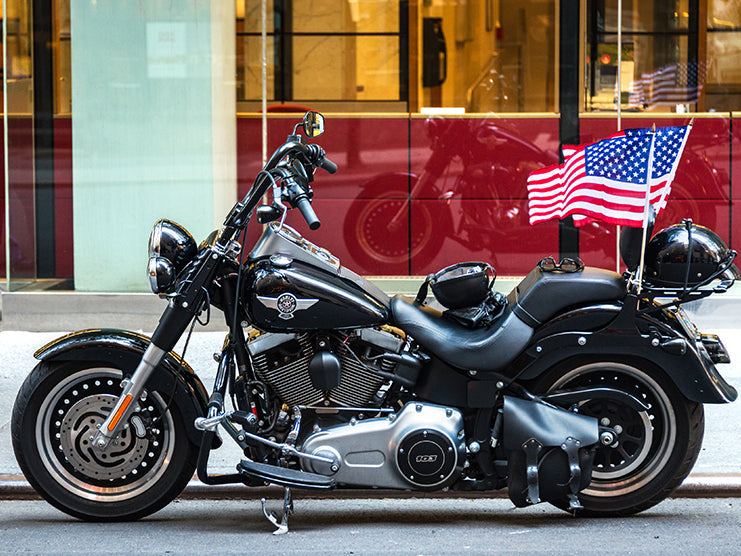Table of Content
1. Introduction
Rhode Island, or “Little Rhody,” has a long list of strict motorcycle laws in place to encourage more responsible behavior from those who ride the high-powered two-wheel motor vehicles. Having the ability to ride a motorcycle can be exhilarating and can instill a feeling of power. However, that enthusiasm needs to be tempered sometimes with strict regulations so that motorcyclists do not recklessly endanger themselves and those around them.
Established in the interest of educating new and old motorcyclists, this article will cover Rhode Island’s motorcycle laws and steps for getting a license.
2. Rhode Island Motorcycle Insurance

While accidents are few and far between if you ride carefully, they can still happen at a moment’s notice. Inattentiveness, mechanical failure, or natural hazards can lead to your vehicle lying broken on the ground. This is why it is important to have motorcycle insurance that is valid in Rhode Island.
Most automobile liability policies tend to consist of liability for bodily injury, liability for property damage, and uninsured/underinsured motorist coverage. When you are in Rhode Island, your motorcycle insurance must at least include these expenses:
$25,000 for bodily injury to a person per accident
$50,000 for bodily injuries to multiple people per accident
$25,000 for property damages sustained per accident
Aside from bodily injuries and property damages, there can be other costs that your insurance does not cover that can accumulate following an accident. The insurance examples listed here are optional but could provide additional coverage that could help you out of a financial pinch.
Uninsured coverage
Underinsured coverage
Collision coverage
Comprehensive coverage
Bodily injury coverage
Medical payment coverage
3. Rhode Island Motorcycle Helmet Laws

In Rhode Island, riders and passengers under 21 years old have to wear a motorcycle helmet. Individuals over 21 years old only have to wear a motorcycle helmet when they decide. Unfortunately, this has caused an increase in motorcycle fatalities in recent years:
In 2019, preliminary data indicated that 30% of motorcycle fatalities were not wearing motorcycle helmets
On average, motorcyclists tend to represent 14% of all traffic-related fatalities
Wearing motorcycle helmets reduce the risk of death by 37%
Wearing motorcycle helmets reduce the risk of head injuries by 69%
The motorcycle helmets that are proven to be effective at reducing shock, absorbing impacts, and keeping your head intact are three-quarter and full-face helmets. Additional criteria to look out for is that the motorcycle helmet was made by the Snell Memorial Foundation and complies with the U.S. Department of Transportation.
| Requirements | Three-Quarter Helmet | Full-Face Helmet |
|---|---|---|
| Has the Department of Transportation (DOT) sticker | ✔️ | ✔️ |
| Contours around your head to fit snugly due to comfort padding | ✔️ | ✔️ |
| No signs of damage Ex:// cracks, loose padding, scratches, or frayed straps |
✔️ | ✔️ |
| Has a face shield with no scratches | ❌ | ✔️ |
| Includes separate eye protection with no scratches Ex:// goggles, glasses |
✔️ | ❌ |
| Has a hard and durable outer shell that is shatter-resistant | ✔️ | ✔️ |
| Has an impact-absorbing liner inside the helmet | ✔️ | ✔️ |
| Gives you a clear, peripheral view of your surroundings | ✔️ | ✔️ |
| Securely fastened with neck- or chin-strap | ✔️ | ✔️ |
| Allows airflow without fogging up | ✔️ | ✔️ |
| Can allow you to wear sunglasses underneath | ✔️ | ✔️ |
4. Rhode Island Motorcycle License Laws

4.1 Rhode Island Motorcycle Permit
To start your journey, you first need to train while holding onto a Rhode Island motorcycle permit. Being only useful for 18 months, you can get one if you are 16 years old and have paid a fee of $27.50.
To be given the permit, you must fulfill all of the listed criteria:
-
If you are under the age of 18:
Have signature and consent from a parent or legal guardian
Complete 33 hours of driver education
Provide proof of Rhode Island residency
Provide proof of U.S. citizenship
Provide identification documents
Take a photo
Pass the knowledge exam
Pass the vision exam
Pay the required fees
Possessing a Rhode Island motorcycle permit allows you to operate a motorcycle within reason for a beginner. Therefore, you must ride while keeping these rules in mind:
You cannot transport passengers
You cannot operate on the freeways
You must be supervised by a 21-year-old with a valid motorcycle license
You must wear protective gear
4.2 Rhode Island Motorcycle License
After you have finished practicing with the permit, you should be ready to receive a Rhode Island motorcycle license. Being valid for five years, you can get one if you are 16 years old and have paid a fee of $27.50.
Listed below are the requirements you will need to fulfill to obtain a Rhode Island motorcycle license:
| Requirements | Applicants Ages 16 to 17 |
Applicants Ages 18 and Above |
|---|---|---|
| Have a valid Rhode Island driver’s license | ✔️ | ✔️ |
| Complete a motorcycle safety course provided by the Community College of Rhode Island | ✔️* | ✔️* |
| Complete a 33-hour long Rhode Island Driver Education course | ✔️ | ❌ |
| Held onto a Rhode Island motorcycle permit for at least 30 days | ✔️ | ✔️ |
| Provide proof of Rhode Island motorcycle insurance | ✔️ | ✔️ |
| Provide proof of Rhode Island vehicle registration | ✔️ | ✔️ |
| Fill out the appropriate driver’s license application | ✔️ | ✔️ |
| Must have the consent of a parent or legal guardian if you are a minor | ✔️ | ❌ |
| Provide your social security number | ✔️ | ✔️ |
| Pay required fees | ✔️ | ✔️ |
| Present valid photo I.D. | ✔️ | ✔️ |
| Take a photo | ✔️ | ✔️ |
| Take vision exam | ✔️ | ✔️ |
| Pass the knowledge test | ✔️ | ✔️ |
| Pass the road skills test | ✔️* | ✔️* |
| Provide proof of U.S. citizenship | ✔️ | ✔️ |
| Provide proof of residency in Rhode Island | ✔️ | ✔️ |
*Submitting a Certificate of Completion for a motorcycle safety course provided by the Community College of Rhode Island will allow you to waive the roads test.
4.3 Rhode Island Motorcycle License Test
Written Portion:
Complete 25 multiple-choice questions
Questions will be based on content from RI DMV Driver’s Manual
Will be tested on an understanding of road rules and safe riding practices
Requires a passing grade of 80% or higher
Any applicants who fail the written portion must wait at least eight days before they are allowed to retry.
Riding Skills Portion:
Will be conducted in a controlled, off-street area
Your motorcycle will be subjected to a pre-ride inspection to ensure it meets safety standards
Demonstrate a basic understanding of motorcycle operation
You will be tested on your ability to stay within the speed limit, adjusting speed and position, maintaining visibility, operating under stress, accelerating, braking, turning, stopping, and swerving
The examiner will grade you based on how well you ride at safe speeds, stay within the lanes, and demonstrate riding maneuvers
Upon failing the road skills test the first time, applicants must wait at least 30 days before they are allowed to retry. Upon a second failure, applicants must wait at least 90 days. After a third failure, applicants must wait at least 180 days.
5. Rhode Island Passenger Laws
As there are no laws in Rhode Island that deem it illegal to carry passengers under a certain age, you could technically transport anyone you like.
A passenger has to be seated in a safe position that is clear of the operator. The position also has to have enough space to allow the incorporation of a passenger seat, handholds, and footrests. It is best to place your passenger seat at one of these locations:
The back part of a large driver’s seat
Towards the rear as a separate saddle
Fixed to the side as a sidecar
While there are no written rules that say your passengers have to be or above an age range, it is not necessarily safe for everyone to be on your motorcycle. The previous safety features mentioned are in place so that passengers will stay secure. But the features will not matter if the passenger cannot reach or hold them. Your passenger has to be able to:
Reach the footrests
Wear an approved motorcycle helmet
Comply with not carrying packages
Understand and follow your directions
6. Rhode Island Lane Splitting Laws

Rhode Island does not permit motorcyclists to apply lane splitting in their travels. Lane splitting is when motorcyclists ride between lanes or rows of traffic as a way to avoid being stopped in place. As you travel through Rhode Island, take care to avoid trying any of these:
Riding on top of the dividing lines between lanes
Riding in between adjacent rows of stopped or slowed vehicles
Overtaking a larger vehicle ahead in the same lane
Riders are not forbidden from riding in the same lane with at least one other motorcyclist or lane sharing throughout Rhode Island. Recommended for experienced riders only, they can try any of these if the conditions are right:
You are allowed to make full use of the space within a single lane
-
You can only share a lane with another motorcycle if:
Both parties stay apart at least two abreast
Both parties consent beforehand
7. Motorcycle Equipment Requirements

In Rhode Island, you must bring your motorcycle in for a vehicle and safety inspection before June 30th every year. Given enough time, even the hardiest of your motorcycle’s components will become inoperable without maintenance. Check all of these parts listed below to confirm that your motorcycle is in a state where it is okay to ride out on the streets:
Horn
Wheels
Tires
Handlebars
Brake System
Controls
Headlight
Taillight
Brake Light
Turn Signals
Exhaust System
Muffler
Rearview Mirrors
8. Sources
- Rhode Island Division of Motor Vehicles - Driver’s Manual
- Consumers Guide to Auto Insurance
- Rhode Island Department of Transportation - Motorcycle Safety
- Rhode Island Division of Motor Vehicles - Motorcycles
- Rhode Island Division of Motor Vehicles - New License Permits
- Rhode Island Division of Motor Vehicles - License Renewal
- Rhode Island Division of Motor Vehicles - Knowledge Exams
- Rhode Island Division of Motor Vehicles - Road Tests
- Rhode Island Division of Motor Vehicles - Fee Schedule













Leave a comment
All comments are moderated before being published.
This site is protected by hCaptcha and the hCaptcha Privacy Policy and Terms of Service apply.